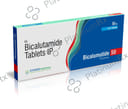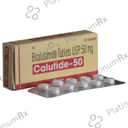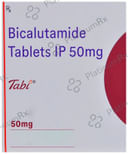Bicalutamide
Uses
Bicalutamide is used in the treatment of prostate cancer, polycystic ovarian syndrome (PCOS), and excessive hair growth.
How it Works
How Bicalutamide works Bicalutamide inhibits the effects of natural male hormones on the growth of prostate cells. Additionally, it prevents the unwanted effects of androgens in females, such as excessive hair growth and acne.
Side Effects
Common side effects of Bicalutamide include weakness, nausea, anemia (low red blood cell count), constipation, hot flashes, breathlessness, blood in urine, pain, infection, peripheral edema, diarrhea, and nocturia (increased urge to urinate during the night).
Expert Advice
- You have been prescribed Bicalutamide for the treatment of prostate cancer.
- Take it with or without food, preferably at the same time every day.
- It may cause your skin to become light sensitive; avoid direct exposure to excessive sunlight.
- Use sunscreen when outdoors.
- If you are diabetic, monitor your blood glucose regularly while taking Bicalutamide.
- Your doctor may want you to have regular blood tests to monitor your liver function while you are taking this medicine.
- Inform your doctor if you notice any of the following symptoms:
- Yellowing of eyes or skin
- Dark urine
- Stomach pain
- Do not stop taking the medication without consulting your doctor first.
- Do not drive or engage in activities requiring concentration until you know how Bicalutamide affects you.
Related Medications
Bicalutamide 50mg

₹360

₹197.3
MRP ₹394.7
Bicalutamide 50mg

₹484

₹197.3
MRP ₹394.7
Bicalutamide 50mg

₹388.1

₹197.3
MRP ₹394.7
Bicalutamide 50mg

₹350

₹197.3
MRP ₹394.7
Bicalutamide 50mg

₹390

₹197.3
MRP ₹394.7
Bicalutamide 50mg

₹462.5

₹197.3
MRP ₹394.7
Bicalutamide 50mg

₹197.6

₹197.3
MRP ₹394.7
Bicalutamide 50mg

₹1,363.9

₹197.3
MRP ₹394.7
Bicalutamide 50mg

₹410

₹197.3
MRP ₹394.7
Bicalutamide 50mg

₹590.2

₹197.3
MRP ₹394.7
Bicalutamide 50mg

₹494.2

₹197.3
MRP ₹394.7
Bicalutamide 50mg

₹390

₹197.3
MRP ₹394.7
Bicalutamide 50mg

₹506.2

₹197.3
MRP ₹394.7
Bicalutamide 50mg

₹375

₹197.3
MRP ₹394.7
Bicalutamide 50mg

₹432

₹197.3
MRP ₹394.7
Bicalutamide 50mg

₹678

₹197.3
MRP ₹394.7
Bicalutamide 50mg

₹387.7

₹197.3
MRP ₹394.7
Bicalutamide 50mg

₹432

₹197.3
MRP ₹394.7
Bicalutamide 50mg

₹440

₹197.3
MRP ₹394.7
Bicalutamide 50mg

₹400

₹197.3
MRP ₹394.7
Bicalutamide 50mg

₹368.4

₹197.3
MRP ₹394.7
Bicalutamide 50mg

₹525

₹197.3
MRP ₹394.7
Bicalutamide 50mg

₹374

₹197.3
MRP ₹394.7
Bicalutamide 50mg

₹1,430.2

₹197.3
MRP ₹394.7
Bicalutamide 50mg

₹1,300.1

₹197.3
MRP ₹394.7
Flat ₹100 off on first app order | Use Code: APP100 |
Flat ₹100 off on first app order
USE CODE: APP100

Download Now